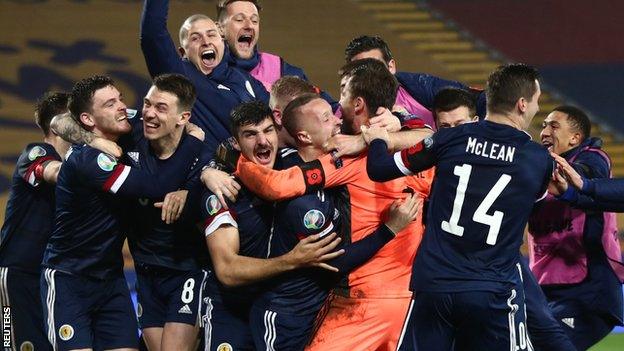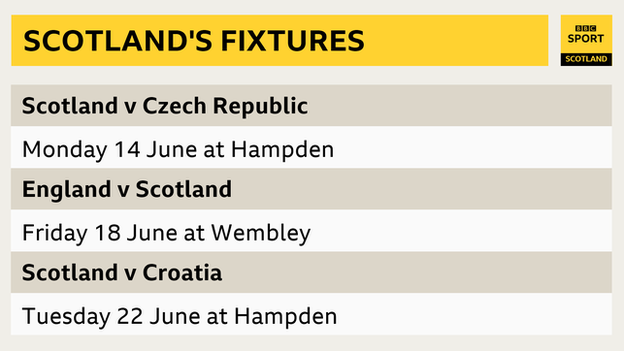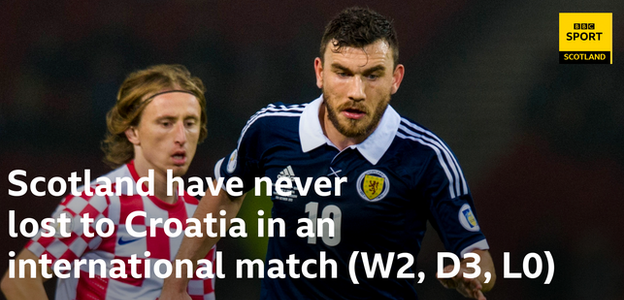Euro 2020: Scotland have qualified... but what happens now for national team?
- Published
- comments

Scotland needed 120 minutes and a penalty shootout to end their 23-year wait
Scotland have - quite unbelievably - done it.
The enormity of it all may yet take a while to sink in, but after more than two decades of failure, the national team will grace a men's major tournament again.
Thursday's play-off final win in Serbia has sent Steve Clarke's men marching on to Euro 2020. But what happens next?
When are the games?
Euro 2020 - delayed a year because of Covid-19 - is scheduled to finally kick off on 11 June, 2021 when Turkey face Italy in Rome.
But the start date that Scotland fans have been craving comes three days later. Hampden will be the setting on Monday, 14 June when Clarke's side - hopefully roared on by a full house, or at least a partial crowd if restrictions have been eased - run out on home turf to face the Czech Republic.
If that wasn't exciting enough, then comes the big one. Scotland then head to Wembley on Friday, 18 June to renew their rivalry with England in international football's oldest fixture.
Nothing would be sweeter for the Tartan Army than evoking the spirit of the 1967 Wembley Wizards by turning over the Three Lions in their own back yard.
Scotland round off the group stage at Hampden on Tuesday, 22 June. The opposition doesn't get any easier - with World Cup runners-up Croatia the visitors - but this is what the party is all about, isn't it?

Uncertainty & Russia rumours
So plenty to look forward to then? Well, yes, but with quite a big a Covid-shaped caveat. Uncertainty continues to hover over next summer's finals, with Glasgow one of 12 host cities across the continent.
Amid the ongoing impact of the pandemic, a pan-European games with fans pouring in from and to different countries may not be the most sensible approach.
Uefa is holding firm - for now. The governing body has dismissed reports in French newspaper Le Parisien that it is considering making Russia the sole hosts. Uefa has not, though, ruled out changing the format of the tournament, so it's a case of wait and see.
Wouldn't it just be typical Scotland if their first finals in two decades ended up being scrapped, or games moved from Mount Florida to Moscow?
What about the opposition?
Let's push aside any pessimism and assume the tournament goes ahead as planned. What are Scotland's chances of making it past the group phase of a major finals for the first time?
With the top two teams from each section going through, along with the four best third-place teams, there is scope for Clarke's men to make more history.
England are the group's heavyweights and highest ranked team - fourth in the Fifa standings - and their array of talent is well known north of the border.
Gareth Southgate's side breezed through their qualification group, winning seven of eight matches, scoring 37 goals. Twelve of those came from captain and star striker Harry Kane, the top scorer in the qualification stage.
Kane, of course, was the scourge of Scotland when the sides last met, scoring in injury time to salvage a 2-2 draw in a World Cup qualifier in June 2017. An opportunity for revenge beckons.

Croatia - like England - qualified automatically, finishing three points ahead of Wales at the Group E summit. They are ranked ninth in the world, but have struggled for form since international football returned, losing three of their four Nations League fixtures.
Zlatko Dalic remains in charge, having led the Croats to the 2018 World Cup final, where they were beaten by France. Striker Mario Mandzukic was among the key players to retire from international football in the wake of defeat, but their squad still features plenty of quality.
Real Madrid midfielder Luka Modric is still pulling the strings for his country at 35. Chelsea midfielder Mateo Kovacic is also a regular. And Rangers' Borna Barisic had made the left-back berth his own.
The Czech Republic booked their finals place as runners-up to England in Group A after winning five of their eight matches. They are a side that Scotland are familiar with, having lost both Nations League meetings with Clarke's side in recent months.
The Czechs' head coach Jaroslav Silhavy was not in charge for either of those two games, however, because of Covid-related reasons. They are ranked joint 45th by Fifa, alongside Scotland.
Watch: Sportscene pundits celebrate moment Scotland's heartache ended